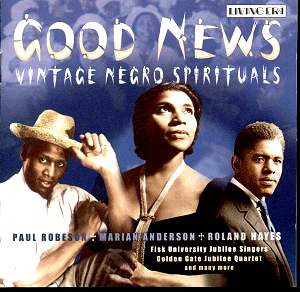Steal Away
Sit Down
Roland Hayes - tenor & Lawrence Brown
- piano
It's Me O Lord Standin' in the Need of Prayer
Go Down, Moses
John Payne - baritone & Lawrence Brown
- piano
Tone de Bell
I'se been 'buked
Gwina lay down my life
Edna Thomas - mezzo-soprano & Colin M.
Campbell - piano
Mary, Don't You Weep
The Utica Jubilee Singers
I ain't a-gonna grieve
Aimee Semple McPherson with choir
Swing low, Sweet Chariot
Joshua fir de Battle ob Jericho
Deep River
Git on Board, l'l Children
Paul Robeson - bass & Lawrence Brown -
piano
Spritual Medley -
I Got A Robe - Steal Away - Ev'ry Time I Feel
The Spirit - Nobody Knows De Trouble I've
Seen
Layton & Johnstone & Turner Layton
- piano
Down to de Rivah
John Charles Thomas - baritone & Carroll
Hollister - piano
Spritual Medley -
I Will Pray - I Want To Be A Christian - Gwine
Ride Up In A Chariot
John Payne - baritone & his Spiritual
Choir with mustel organ accompaniment
I'm Gonna Shout All Over God's Heab'n
Forbes Randolph & his Kentucky Jubilee
Choir
Sometimes I Feel Like A Motherless Child
Lord, I can't Stay Away
Dere's No Hiding Place Down Dere
Were you there?
Ev'ry Time I Feel The Spirit
Marian Anderson - contralto & Kosti Vehanen
- piano
De Blind Man Stood On The Road and Cried
The Morris Brown Quartet
The Story of Job
Rock My Soul
The Golden Gate Jubilee Quartet
Crucifixion (He Never Said A Mumberlin' Word)
Roland Hayes - tenor
Plenty Good Room
Recessional (Roun' 'Bout De Mountain)
Roland Hayes - tenor & Reginald Boardman
- piano
Blow Gabriel Blow
The Fisk University Jubilee Singers
Nobody Knows The Trouble I've Seen
Paul Robeson (bass)
Lawrence Brown (piano)
Spirituals compilations are
not exactly scarce and specialist companies
have delved deep into the recorded evidence
to produce documentary discs of some importance.
So elsewhere – but not on Living Era - we
can sample the diverse talents of Jules Bledsoe,
Dorothy Maynor and Ellabelle Davis and choirs
such as the Tuskegee Institution Singers and
the New Orleans University Glee Club – I can
recommend Freameux FA168 for a solid two CD
selection which includes them all, as well
as stars such as Marian Anderson and Roland
Hayes.
Nevertheless within the confines
of a single disc selection – a round-up of
individual and collective talent – this new
release has considerable appeal. The discs
were recorded between 1921 and 1945 and they
are presented in rough chronological order.
As the notes make clear some of the most important
early discs were made in London by Roland
Hayes and by John Payne, both accompanied
by the pianist of choice in the genre, the
estimable Lawrence Brown. Hayes was signed
early by Vocalion and Payne seems to have
veered between Columbia and HMV. All were
acoustic discs and they sound splendid in
these restorations. Hayes was of course the
doyen of solo artists recording at the time
and his cultivated tenor – he was a classically
trained singer of distinction – is profoundly
impressive. His later recordings from 1939
are every bit as magnificent as the acoustics.
Payne is less cultivated, less the artist,
but his rather rougher tone is still effective.
Following rather in Hayes’s
steps was Edna Thomas and she exemplifies
the fissures opening up between the concert
spiritual and the rougher pattern trodden
by such as John Payne. She has a well modulated
if slightly lightweight mezzo and her approach
in her 1928 New York coupling is rather of
the polite school. The noted baritone John
Charles Thomas is here, as his better-known
compatriot Lawrence Tibbett is not, essaying
from the vantage of the white concert platform.
The "jubilees"
– the small choirs – vary in sonority and
approach. That accompanying Aimee Semple-McPherson
in her 1926 recording of I Ain’t A-Gonna
Grieve, an anonymous group, is decidedly
dicey if enthusiastic. But the established
leaders in the field, the Kentucky, the Fisk
and the Golden Gate prove adept, sonorous
ambassadors. Outstanding is the precision
and sonority of Forbes Randolph and the Kentucky
Jubilee Choir on I'm Gonna Shout All Over
God's Heab'n and the athletic vivacity
of the Golden Gate in The Story of Job.
Note too their instrumental mimicry (rhythmically
galvanising basses) in Rock My Soul.
I’ve mentioned neither Paul
Robeson nor Marian Anderson both of whom naturally
appear. These tracks have been multiply released
and most will know them – or know of them.
They’re all well transferred.
Rather an anomalous contribution
comes from Layton and Johnstone; their variety-style
medley is short on substance if an intriguing
sidelight on the popularity of the genre in
London in the early 1930s.
With good notes and those
attractive transfers this is a thoughtful
and broad survey of spirituals in a vivid
quarter century on disc.
Jonathan Woolf
With good notes and those
attractive transfers this is a thoughtful
and broad survey of spirituals in a vivid
quarter century on disc. ... see Full Review
